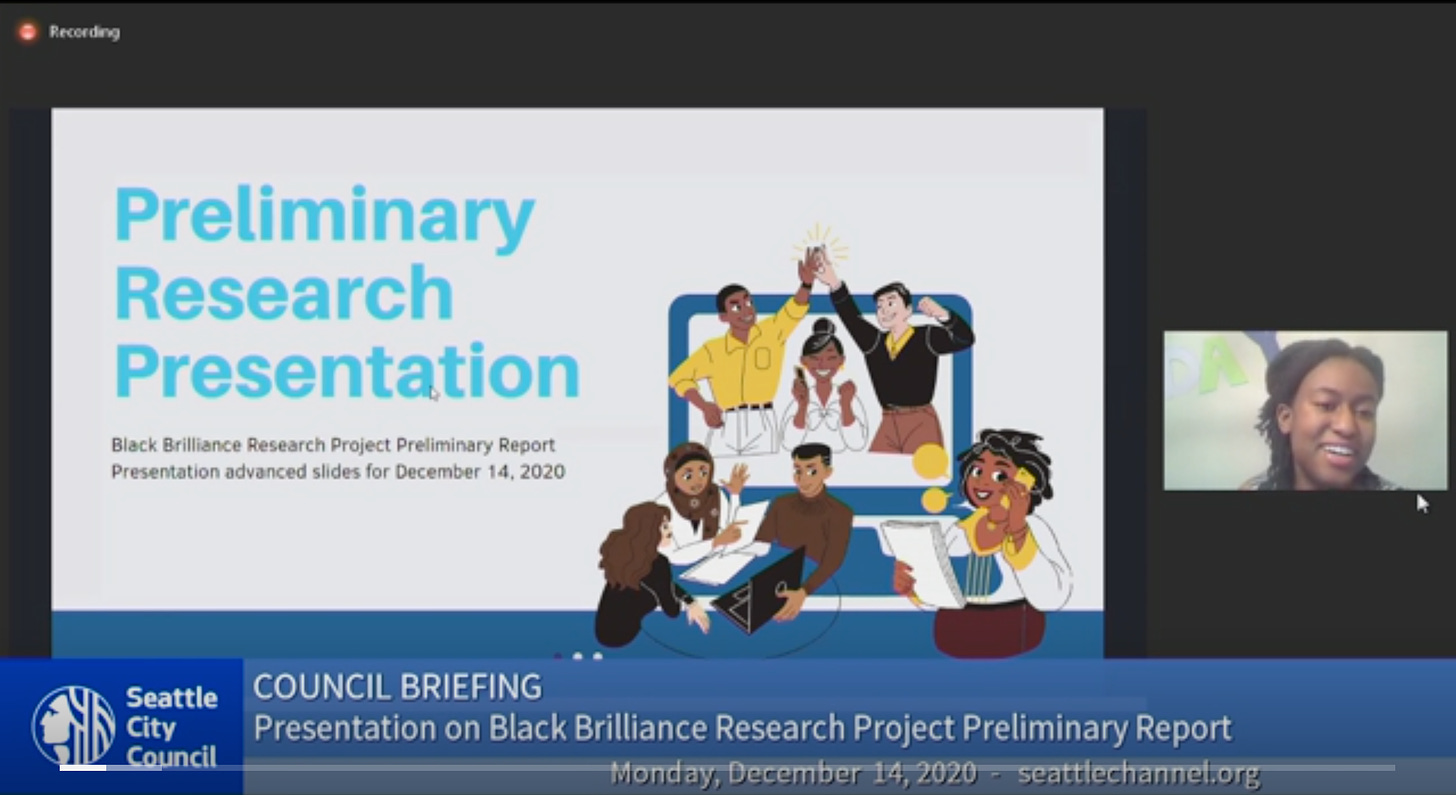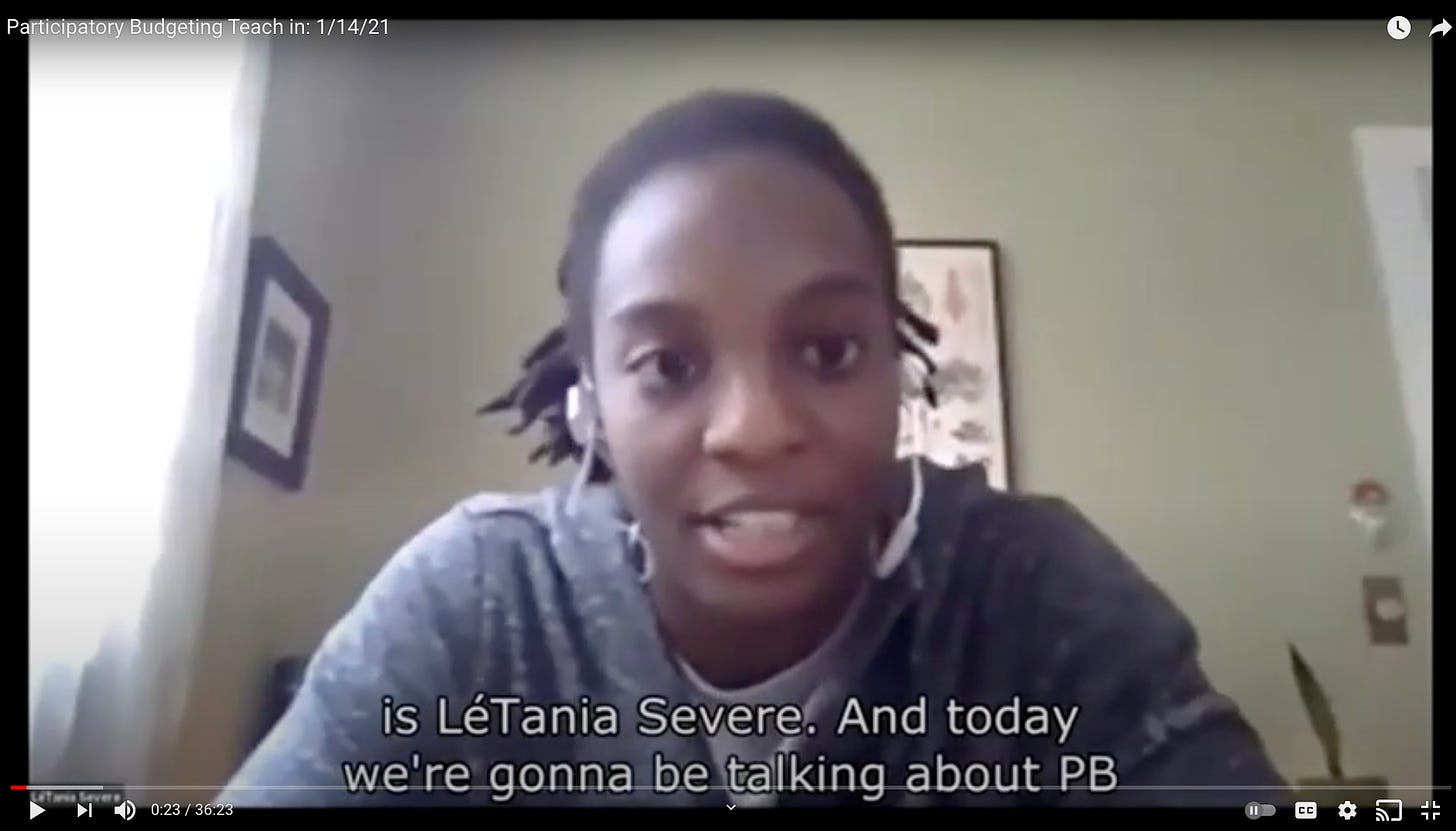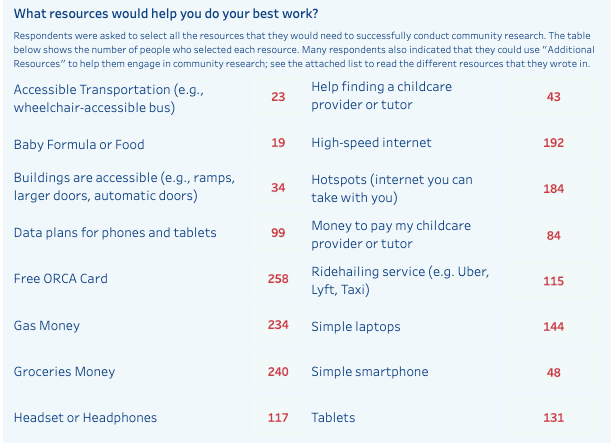❤️ 🧡 💛 💚 💙 💜 🤎 🖤 All Black Lives Matter ❤️ 🧡 💛 💚 💙 💜 🤎 🖤
Who we are
We are a group of volunteers collaborating towards the abolition of policing and incarceration in our community. This newsletter was created in service of that mission. There are a lot of ways you can help out.
Background
Some context from Angélica Cházaro, via Seattle PB Outreach:
“None of this would be happening without the uprising in defense of Black lives that so many of us were part of this past summer and fall. Without the 1000s of folks who took to the streets, in some cases every single day and night for months and months and who continue to do so, we would not be here right now. This also would not be happening without the reckoning of the role of policing in our lives in our city, which moved into the budget fight--into the virtual halls of city council this summer and fall."
Under pressure last summer and fall, Seattle City Council acknowledged the need for community-led alternatives to policing. Among other council actions (see below), they partially defunded the SPD and allocated $3M for the Black Brilliance Research Project (BBRP; see below) and $30M for Participatory Budgeting (PB&J; see below).
This newsletter is intended to elevate and support abolitionist work including that of BBRP and PB. Our intended audience is fellow volunteers who want to stay up-to-date and help out. We encourage giving via mutual aid to those most affected by policing and incarceration and to those who are doing the work to put an end to the perpetuation of harm (see “Direct Support” below). Together, we are building a safer, more socially-conscious and self-sufficient community that better supports the wellbeing of all. It is in our self-interest to do this work.
We intend to publish on Tuesdays every two weeks. Submissions are invited by 5 pm on the Friday before publication (next deadline: Feb 5). Topics should have a clear connection to abolition.
-Peter Shellito (he/him), Jack Irwin
Support from City Council
During the City of Seattle’s budget season in the fall of 2020, the City Council took several steps towards divesting from the SPD:
They allocated $30m to the Participatory Budgeting process, as well as retaining $10m promised in the summer to community-led public safety investments.
They cut the SPD’s budget by around 20%, although many of these cuts were created by transferring various departments outside the SPD. They achieved an 8.2% budget decrease not including these transfers.
They created a new Community Safety and Communications Center to house a civilianized 911 call response center.
They provided funds to hire additional mental health workers, consulting nurse, and crisis counselor, as well as to expand the Health One program.
They maintained their intent from the summer to lay off 35 sworn officers (this still needs to be bargained with the police union).
They eliminated many open positions for sworn officers in the police department, which will provide at least a small obstacle towards expanding its numbers in the future.
-Amy S., Notes from an Emerald City
Black Brilliance Research Project
During the summer 2020 budget re-balance, Seattle City Council allocated $3M for community-led research into non-police alternatives for public safety. The Black Brilliance Research Project (BBRP) was awarded that contract and presented their initial findings to City Council on December 14. You can watch that presentation here (2:45-38:30).
BBRP has identified 5 primary issues that are critically important to community:
Housing and physical spaces, including Black-led residential and commercial spaces
Mental health
Youth & children
Economic development
Crises & wellness. Here researchers emphasized the need for the new 911 civilian crisis response center to hire people who have relevant lived experiences
BBRP issued 5 overall recommendations to Council members going forward:
Stop causing harm -- acknowledge the systems that harm community members, and stop punishing individuals for the failures of systems
Create inclusive policies that prioritize lived experience and address the root causes of harm
Follow Black leadership. Effective and innovative solutions will come from people who are living closest to the issues.
Pay for community expertise
Invest in solutions
-Raymond Sanchez (he/him)
PB&J: Participatory Budgeting and Justice
At the first Participatory Budgeting Teach-in (Wednesday, January 14; watch the recording here), Black Brilliance Research Project research leads Shaun Glaze and LéTania Severe educated attendees on how the City of Seattle will dedicate $30M in public funding to participatory budgeting in 2021. First used by Seattle in 2015, participatory budgeting gives residents direct input into how public funds will be spent. (You can learn more in this short informational video from the Participatory Budgeting Project.) This cutting-edge democratic tool will shape how the city reinvests money from the police department to communities most impacted by police violence. At the teach-in, Shaun and LéTania outlined the timeline for the process.
The meeting concluded with some ways that volunteers can help out right now:
Get information out. Educate your community via an informal teach-in or casual conversations.
Create artwork, music, and media content to promote PB. Keep an eye out for work by others.
Identify barriers in your community to participating in PB.
Think about other ways you want to be involved and reach out to Emma or another PB volunteer.
Everyone is encouraged to sign-up to receive PB outreach emails by filling out this form here regardless of whether you know how you intend to participate. You can find other PB links here: https://eztree.me/SeattlePB_outreach.
-Emma Lower (she/her)
Direct support
Lady Dane and J Mase III are Black Brilliance Researchers and editors of The Black Trans Prayer Book, which centers Black trans liberation theology. Their work challenges white supremacy and transphobia simultaneously. By centering the most marginalized, they contribute to a crucial component of community wellbeing: mental health and wellness. Hear them speak about their work here: https://fb.watch/2rqCySNhnj/.
If you would like to support this team, there are many ways to do so in the above video, including the venmo accounts of the two editors @JMase-Mase @LadyDane as well as three contributors, Seyi Adebanjo (@seyi-adebanjo), Audria LB (@audrialb), and Wit López (@Wit-Lopez).
Learn more about TBTPB at https://theblacktransprayerbook.org/
-Peter Shellito (he/him)
Naudia Miller (Nas) was a guest at our volunteers catch-up meeting last week. Nas is, among other things, a Black Brilliance Researcher, Interim Executive Director of the Harriet Tubman Foundation for Safe Passage, and partner at Black & Tan Hall llc. Follow her on instagram @justcallmenas. Show your support and appreciation for her speaking with us last Wednesday via venmo (@Naudia-Miller) or https://paypal.me/PatriciaM116. Learn more and buy tickets to her upcoming “Taboo Topics” lecture at https://www.justcallmenas.com/.
-Peter Shellito (he/him)
In my mind mutual aid efforts are connected to abolition by ensuring individuals’ basic needs are met which leads to community health and safety. Here is a quote from Dean Spade (pdf) that articulates this:
"Mutual aid lets people learn and practice the skills and capacities we need to live in the world we are trying to create—a world shaped by practices of collective self-determination. Mutual aid can also generate boldness and a willingness to defy illegitimate authority."
FOLX is a mutual aid group that is providing resources for houseless individuals to meet their basic needs: food, clothing, and shelter. When people have their basic needs met, our communities are safer and healthier. The organizers at FOLX are also encouraging community members to engage directly with and provide support to people without housing in their neighborhoods. This is a humanizing move toward community interdependence and away from policing systems. You can support their work through their venmo @FOLX_Seattle or by donating goods directly. Follow their work on instagram and facebook.
-Renee Lamberjack (she/her)
Education
Signing my name to a statement calling for "the abolition of policing" made me want to wrap my head around the term with greater understanding. I did my own research and found this article helpful. I thought I'd share it around. It describes the array of thinking about the term by activists and scholars. No matter how you define it, it's "a serious call to completely rethink the very concept of law enforcement in this country." Published in June, it's surely even more relevant to contemplate now.
All the best,
Pennie
For those looking for a thorough education, Nikkita Oliver is teaching a course on abolition at Seattle University School of Law. They just started the class last week, and all of the course material is available online for free.
To learn more about mutual aid, check out Dean Spade’s new book Mutual Aid: Building Solidarity through this Crisis (and the Next).
Upcoming
Subscribe to the PB outreach channel on YouTube to stay up-to-date with PB. If you aren’t on the PB outreach mailing list, fill out this tiny survey to be added. The button below takes you to the PB homepage and has more ways to follow along with this work. Keep an eye out for additional PB teach-ins and artwork.
Join our next volunteers catch-up meeting Wednesday Feb 3, 6:30-7:30 pm. There will be no special guest this time. It will be a chance to develop our relationships and brainstorm with one another. Please RSVP with Peter (he/him) at shellito@gmail.com to attend.
Volunteer highlights
This section contains examples of what some volunteers have already done to support BBRP and PB. You can view our organizing principles and join us here.
Pennie and Peter have spent some time making teach-in recordings more accessible by transcribing the audio and editing them for clarity. We use a tool called otter.ai, which makes it pretty easy and kind of fun. You can see our work in the captions of the PB teach-in and find the full text from the Jan 14 PB teach-in here. Transcription work is pretty straightforward for new volunteers and will undoubtedly be needed again in the near future. If you would like to help with this, please create a free account on otter.ai and get in touch with Peter (he/him) at shellito@gmail.com to let him know your interest.
Shaun and LéTania have been directing a couple of surveys last fall and this winter. A few volunteers intend to help by conducting some of these surveys by phone. This work requires completing CITI training beforehand, which is not trivial. Thank you to Anders, Emma, Peter, and Pennie for taking that task on. We could use one or two additional volunteers if anyone is up for this sort of work. Please get in touch with Anders (They/Them) tevisaa@gmail.com.
As of January 9th, over 1,000 community members had taken the Black Brilliance Research Project's community needs assessment survey! The survey asks community members what resources they need in order to engage in community research and the PB process. Shaun and LéTania asked for someone to help analyze the data, so I created some dashboards using a data visualization software called Tableau. The table below shows the counts of people who indicated that they need each resource: the three most requested resources were ORCA cards, gas money, and grocery money. These results demonstrate why it's important that a lot of the funding dispensed so far has been set aside for things like technology and transportation.
Not only do the survey results reveal the level of need for each resource, they help Shaun and LéTania understand how effectively the survey has been distributed and who they are in contact with. I also created a map that shows the distribution of survey results by zip code and a demographics dashboard. These can help determine if there are geographic areas or communities that could be engaged more deeply.
The graphics were submitted to City Council as part of a preliminary report and will likely be reworked for the final report. This work helps build a strong foundation for a successful PB cycle in 2021, so that community members can hit the ground running when it's time to propose projects!
- Alice Mar-Abe (she/her)
Many volunteers have contributed to this first issue of the S.A.S. newsletter. We appreciate your interest in abolition and welcome your feedback.




